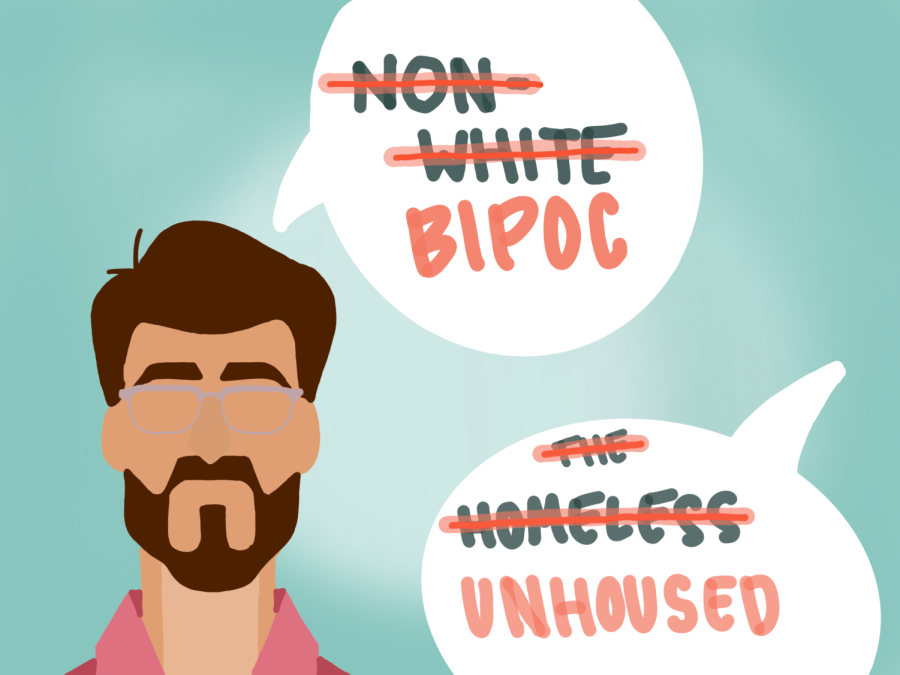Language Matters: 6 Words We Need To Retire
While seemingly trivial, our word choice is extremely influential, possessing the power to maintain or terminate harmful stereotypes.
February 8, 2023
Language is alive — constantly evolving to most accurately bridge the gap between experiencing and verbalizing.
It is important to evolve with language, changing not only your vocabulary but also your understanding of the words you utilize.
It can be easy to view our words as insignificant, acting merely as a vehicle to get our general point across, but that is not the case.
Without-a-doubt, there is a movement that resists the perpetual need for changing language, arguing “the absurdity of political correctness” — a term for specific language, measures, and policies made to mitigate the further marginalization of historically marginalized communities.
But it is not an inconvenience to change your vocabulary if it will mitigate harm for those who face injustice; it is a privilege to not be on the receiving end of discriminatory language. Thus, it is not up to those who are privileged to determine whether a term reaches a legitimate threshold of discrimination, for they are protected from the harm.
Here are six words you can remove from your vocabulary today. Their racist, sexist, or otherwise demeaning notions will live on so long as their entrenchment in our vocabulary does.
Master Bedroom
The “master bedroom” gained physical and verbal traction after World War II, as large and private bedrooms were implemented into many American homes. It is unclear whether this term’s origin is a direct byproduct of racism, but without-a-doubt, it evokes a history of slavery-era race relations — referencing masters and slaves — perpetuating the lasting legacy of white dominance and Black subordination.
Instead, try to replace this term with “primary bedroom” — a simple yet effective change.
Wife Beater
The term “wife beater” refers to a white, ribbed tank top or undershirt. How did such a rudimentary piece of clothing get such a violent name? The general consensus is that it started with a domestic violence case in 1947, in which James Hartford Jr. was arrested for fatally abusing his wife; a photo spread of him in an undershirt, captioned “wife-beater.” The term was further ingrained as violent men wearing this tank top were highlighted in different forms of media.
No matter the origin, the term “wife beater” is semantically linked to violence against women, insidiously normalizing language that perpetuates male dominance and abuse. Despite pop culture’s mindless adoption of “wife beater” into our nation’s vocabulary, we have the power to change the narrative, starting on an individual level.
It is not only harmful but exceedingly odd to refer to an article of clothing in such a violent manner. Instead, simply use “tank top” or “undershirt” — adding “white” and “ribbed” for more detail.
The Homeless
Referring to unhoused individuals as “the homeless” puts their circumstance before their identity, failing to acknowledge the shared humanity among all humans — houseless or not. Digging into it more linguistically, “home-less” seems to imply that you could have a home, but you don’t, whereas “un-housed” implies that we should be housed, but many people do not currently have access to the resources to become housed.
Houselessness is still heavily stigmatized, placing full blame on the individuals who experience it. While individual volition can play a role, the larger issue at hand is the lack of affordable housing and rehabilitative resources to aid the process — a system-based, political issue. Thus, a deeper understanding of homelessness should not only alter our morals but the language we use to vocalize our concerns as well.
Instead of referring to “the homeless,” try “unhoused,” “houseless,” or “people experiencing homelessness” instead.
Addict
Similar to above, “addict” centers the person’s circumstance (in this case, addiction) over their identity as a complex, multifaceted human. Again, this creates a narrative of individual blame, insinuating that the individual is the problem and they are choosing to undergo the debilitating pain of addiction. However, addiction is much more complicated than that; contemporary neuroscience views substance abuse as a chronic brain disease, altering neurobiology and reducing the ability to self-restrain and make healthy decisions.
Additionally, “addict” implies a sense of permanence — a fixed identity. In order to destigmatize addiction and encourage individuals to seek rehabilitative resources, we should stop putting them into a box, perpetuating a stereotype that fails to honor the individual’s unique circumstances.
Instead of “addict,” use “a person with a substance use disorder” or “someone who struggles with substance abuse.”
Non-White
This term insinuates that white is the default race and all other diverse identities fall into a subordinate category. Especially right now, we need to be increasingly conscious about the words we use to reference race and racism; it is a complex matter which is constantly evolving and for us white individuals, we must always be ready to learn new terms and retire old ones.
Preferred terms to replace “non-white” are heavily debated. When referring to anyone who is not white, BIPOC (Black, Indigenous, and people of color), an acronym that has surfaced in recent years, is currently the most accepted and popularly utilized term. It was created to express the different levels of inequity that different races experience, placing the emphasis on Black and Indigenous communities who are most severely impacted by systemic injustice.
It seems as though “BIPOC” is slightly favored over “people/communities of color” and should absolutely replace terms like “non-white” or “colored people.”
However, for this one, it is most important to consume media created by BIPOC individuals to understand their language preferences and the reasoning behind it because language will likely keep evolving and inclusive language can only be created by those who face injustice.
Third-World Country
When Westerners attempt to conveniently characterize developing countries — impoverished nations with lower living standards and dwindling or even nonexistent democracies — one term seems to be most prominent: third-world countries. This is problematic for a myriad of reasons. Semantically, third-world implies that something otherworldly or alien is at hand, as if wealth is the determinant of recognizing humanity. It creates an “us versus them” mentality, dividing humans according to our circumstance and further entrenching the idea that wealth equates dignity.
Additionally, “third-world” implies the existence of a global hierarchy, fueled by wealth and power. It deems countries, and thus, citizens, inferior or superior rather than what we are: equals, attempting to navigate the world within the different levels of freedom, resources, and varying cultures we were born into.
Replacements for “third-world” is a controversial topic. Categorization will always have its downsides, as it removes nuance from conversations by using a singular, generalized term. It is always better to be specific when referring to impoverished countries, but there is a time and place to use broader language. Instead of “third-world” try to use “developing/developed nation” or “majority/minority world” (in which majority refers to countries in Asia, Africa, Latin America, and the Pacific, and minority refers to countries in Europe, North America, Australia, and New Zealand) or “global south/north” for a more geographical, less political option.
Without-a-doubt, our words hold a great deal of power, providing a verbal account of our physical, emotional, and interpersonal reality.
They give us the unrestricted autonomy to express ourselves but with that, comes the easily-exploited discretion to force a narrative upon someone — using language that, perhaps for the purpose of concision, unintended incognizance, or intentional harm, perpetuates a damaging, premeditated assumption.
Mitigating the potential harm is worth the “inconvenience” of a slight vocabulary change; it might take a concerted effort to eliminate habitual use of these words, but we, as intelligent, multifaceted humans, have the undeniable capacity to do so.
These six terms represent a microscopic portion of the discriminatory language that is embedded in our vernacular. Terminating these words from your vocabulary will begin to create a safer space for historically marginalized identities, but it is also just a starting point.
As a general rule, look to the community who you are referring to for guidance on how to address them, for starting from a grassroots level is the only way to ensure authentic and irrevocable respect — a quality that our vocabulary should always reflect.







Diana Platas • Feb 12, 2023 at 2:24 pm
Thank you for sharing these recommendations, and explanations, with others.
Cindy Garcia • Feb 12, 2023 at 1:13 pm
Wow fantastic article. Great historical context with simple ways to change our use of the words. I also loved the first part about us not feeling inconvenienced. Great job. Will be sharing with my coworkers.
Aaron Hollingshead • Feb 9, 2023 at 7:56 am
Love the article. Kudos!
Shannon Buchanan • Feb 9, 2023 at 7:53 am
Great article! Would love to see this posted in the Oregonian.